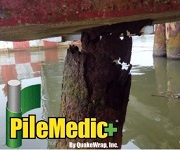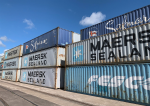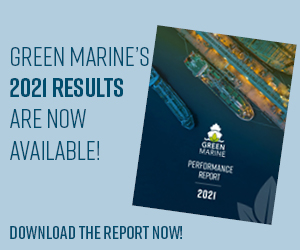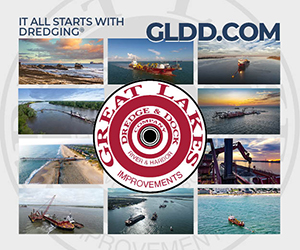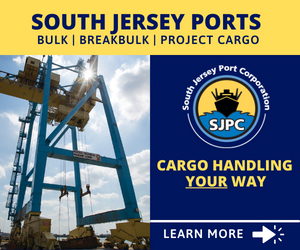The Belledune Port Authority welcomed new leadership to the Board of Directors. Appointed in January, Hermel Vienneau was elected chair by his fellow directors during a board meeting last month. Joining him at the helm is Iris Auclair Bernard, who was elected vice-chair. The Port of New Orleans (Port NOLA) announced Attorney James J. Carter was sworn in as a member of the Board of Commissioners during its board meeting last week. Appointed by Governor John Bel Edwards, Carter succeeds Tara C. Hernandez as one of four Orleans Parish representatives on the seven-member regional board and will serve a five-year term. Port of South Louisiana announced the approintment of Katie Klibert to the Port of South Louisiana Commission. Appointed by Governor John Bel Edwards, Klibert, of LaPlace, LA, will fill the position left vacant by Patrick C. Sellars, who passed away in July.

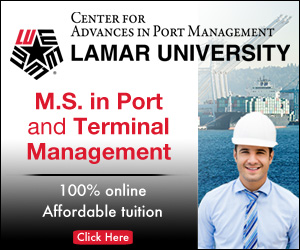
This week, maritime leaders attended a roundtable with Secretary of Homeland Security Alejandro Mayorkas and Secretary of Transportation Pete Buttigieg to discuss maritime cybersecurity and its important role in ensuring continued operation of American supply chains. The Secretaries touted the importance of information sharing and working with trade associations representing various sectors of the maritime transportation system. They also announced an upcoming Request for Information (RFI) on the U.S. Coast Guard’s cyber standards. Representing AAPA were Jill Taylor, Homeland Security Manager for the Port of Los Angeles, and Mark Dubina, Vice President of Security for Port Tampa Bay. Jill and Mark serve as chair and vice chair, respectively, of AAPA’s Security Committee.
AAPA also hosted a webinar with Rear Admiral John Mauger, Assistant Commandant for the Coast Guard’s Office of Prevention Policy. Admiral Mauger briefed attendees about steps the Coast Guard is taking to bolster cybersecurity at ports, including hiring dedicated cyber experts at each Coast Guard sector. He also talked about best practices for sharing threats. A discussion with Admiral Mauger followed the briefing, with comments and questions from the participants largely focused on improving communication between ports and the Coast Guard, increasing guidance for implementation of Coast Guard regulations and reducing redundancy.
|
Mario Cordero, Executive Director of the Port of Long Beach, will share insights from his career connected with the port industry as the keynote lunch speaker on the second day of AAPA's Executive Management Conference (EMC) November 16-18, 2021, in Phoenix, AZ. Cordero’s prestigious career includes serving leadership positions on the Long Beach Board of Harbor Commissioners, Federal Maritime Commission, AAPA Board of Directors, and several other governing boards. Register today to gain leadership and management knowledge shared by Cordero.
|
George Pasha, Chairman and Chief Executive Officer of The Pasha Group, will be speaking at the AAPA Commissioners Seminar, December 7-9, 2021, in San Diego, CA. Attendees will have the opportunity to hear the inside story on how this diversified logistics and transportation company implemented LNG energy to its global operations. The AAPA Commissioners Seminar will deliver timely, relevant content from experts, exclusive networking with colleagues and educational opportunities. Program topics will offer an outlook on global economic trends, insights into alternative energy, and guidance on legal responsibilities of port governing boards. The event will offer companies heightened visibility through sponsorship opportunities and the opportunity to connect with potential customers. View the draft agenda and register today.
|
In an effort to improve cargo movement amid congestion and record volume, the ports of Long Beach and Los Angeles will begin assessing a surcharge to ocean carriers for import containers that dwell on marine terminals. Under the new policy, the ports will charge ocean carriers $100 for each container that falls into one of two categories, increasing in $100 increments per container per day. For containers scheduled to move by truck, ocean carriers will be charged for every container dwelling nine days or more. For containers moving by rail, ocean carriers will be charged if the container has dwelled for six days or more.
|
The Oregon International Port of Coos Bay announced that it has entered into a Purchase and Sale Agreement (PSA) to acquire the former Georgia Pacific Mill site. The port and the current owner, CDC Inc. of St. Louis, MO, have negotiated the terms of the PSA with the goal of job creation on Oregon’s South Coast. The port intends to rehabilitate the site and return it to service, utilizing the facility for the movement of goods and commodities through maritime, rail, and trucking for both domestic and international markets.
|

The Virgin Islands Port Authority announced the use of a new online procurement system for the purchase of goods and services. Current vendors or individuals interested in doing business with VIPA are encouraged to register using the new system to receive e-mail communications when bid events are issued for goods or services. Registration on the new platform is also required to submit bid responses. The new system can be accessed at www.viport.com/purchasing.
|
The Quonset Development Corporation (Port of Davisville) broke ground on a $4 million railway project in a celebration with Rhode Island's Congressional delegation to acknowledge their leadership in securing critical investments for the railway. Quonset received a $3 million Consolidated Rail Infrastructure and Safety Improvements grant from the U.S. Department of Transportation and a $1 million match from the QDC.
|
The Vancouver Fraser Port Authority has reached an agreement with terminal operator WWL Vehicle Services Canada, Ltd. (dba/ WW Solutions) to lead improvements to the Annacis Auto Terminal in Delta. Supported by funding from Transport Canada, the Annacis Auto Terminal Optimization Project will improve the efficiency of the terminal’s operations within the existing footprint, increase its ability to handle a greater volume of automobile imports in the future, and help support climate change resiliency.
|
|
| |
|





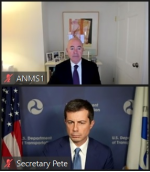

.png)
